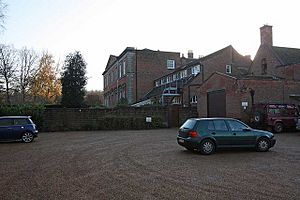Sir John Holland, 2nd Baronet facts for kids
Sir John Holland, 2nd Baronet (born around 1669 – died by July 1724) was an important English politician. He came from Quidenham Hall in Norfolk. Sir John was a member of the Whig party, which was one of the main political groups in Britain at the time. He served in the English and later the British Parliament from 1701 to 1710.
Contents
Early Life and Family
John Holland was born around 1669. He was the second son of Thomas Holland, but became the oldest living son. His mother was Elizabeth Meade. John went to grammar school in Bury St Edmunds. Later, he studied at Christ's College, Cambridge from 1685 to 1687.
In 1698, he took over his father's estate. A year later, in May 1699, he married Lady Rebecca Paston. Her mother, Charlotte FitzRoy, was an illegitimate daughter of Charles II of England. This meant Sir John's future children would be great-grandchildren of a king! In 1701, John inherited the title of Baronet and the family home, Quidenham Hall, from his grandfather, Sir John Holland, 1st Baronet.
Political Career in Parliament
Sir John Holland became a Member of Parliament (MP) for Norfolk in 1701. This was his first time being elected to the House of Commons. He quickly became active in Parliament. He gave his first speech in February 1702. He also acted as a "teller" for the Whig party many times. A teller helps count votes during important decisions in Parliament.
Serving as a Whig MP
Sir John was re-elected in 1702 and continued to be a very busy MP. He often helped the Whigs by counting votes. In the 1705 election, he was re-elected without anyone running against him. This showed how popular he was in Norfolk. He supported the King's choice for Speaker of the House in 1705. He also continued to be a teller for the Whigs.
He was elected again in 1708. In March 1708, he spoke in favor of a bill about cathedrals. He also joined a committee to write a message to the King. This message asked for the war to continue strongly.
Important Roles and Dismissal
In 1709, Sir John voted to allow people from Palatine (a region in Germany) to become British citizens. In March 1709, he was given an important job: Comptroller of the Household. This meant he managed the royal household's finances. He also became a Privy Counsellor in June 1709. This was a high honor, advising the King.
Later in 1709, he was asked to help prepare charges against Dr. Sacheverell. This was a famous case where a preacher was accused of speaking against the government. Sir John became one of the managers of this case. He voted for the charges and helped present the case in February 1710.
However, the Whigs in Norfolk decided not to support him for re-election in 1710. This was likely because some Whigs felt his behavior was not always good. He could not find another seat in Parliament then, or in 1713. In June 1711, he lost his job as Comptroller of the Household. But he was still paid what he was owed and received extra money from the King.
Later Political Attempts
After King George I came to the throne, Sir John did not receive any new jobs. He became unhappy with the Whig leaders in Norfolk. He did not run in the 1715 election. In 1722, he tried to win a seat for Great Yarmouth. However, he was not successful.
Death and Family Legacy
Sir John Holland passed away around 1724. He was buried at Quidenham, his family home. Through his wife, Rebecca, his two sons and three daughters were direct descendants of King Charles II. His son, William, took over the baronetcy after him.
Images for kids
 | Laphonza Butler |
 | Daisy Bates |
 | Elizabeth Piper Ensley |



